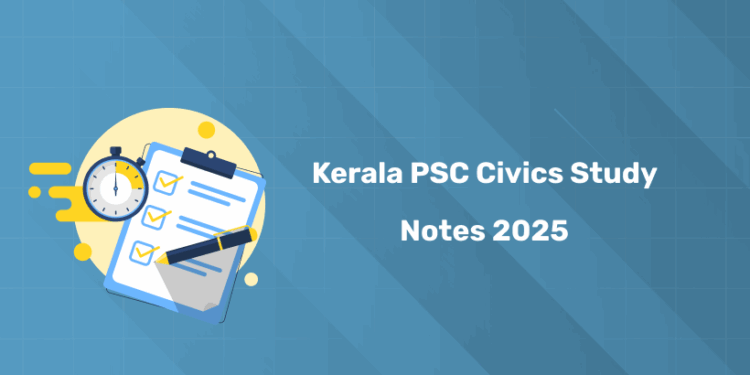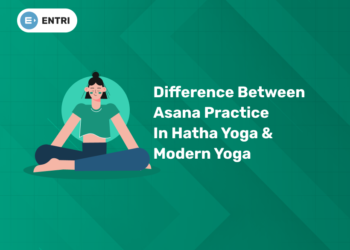Table of Contents
Preparing for the Kerala PSC 2025 exam? Strong Civics notes are essential for success, as these topics are common in the exams! Focus on well-organized material covering the Indian Constitution, governance systems, fundamental rights, and current developments in civics. Regular revision and updated knowledge will give you a clear edge, helping you answer questions accurately and improve your score. Stay consistent and focused—success is within reach!
Civics Notes for Kerala PSC – Download free PDF
You can now download the detailed civics study notes for Kerala PSC 2025 absolutely free in PDF format by clicking on the PDF link given below. These civic notes are a valuable resource to help you prepare effectively for the exams. The notes cover all the significant topics and concepts and will make you feel confident. Download and start learning today!
Civics Study Notes for Kerala PSC 2025
1: Who was the first woman President of India?
Civics is one of the major segments for the Kerala PSC 2025. Given below are the links to some significant topics under Civics. We have prepared comprehensive notes and quizzes regarding each topic. Get your hands on them and get on the right track for the Kerala PSC 2025 exams.
- Human Rights
- Mazdoor Kisan Shakti Sangathan (MKSS)
- Freedom of Information Act 2002
- Lokpal and Lokayukta Act, 2013
- Right to Information Act
Free UPSKILLING Courses!
Take your first step toward mastering in-demand skills, acing interviews, and securing top-tier jobs with Entri's free upskilling courses.
Start Learning!Civics Quiz 2025 – Download Free PDF
Test your knowledge and enhance your Kerala PSC 2025 prep with this Civics Quiz 2025. Download the free PDF now to practice important questions on the Indian Constitution, governance, and current affairs
Kerala PSC Civics Study Notes 2025 – Model Questions
Which of the following is not a fundamental human right according to international law?
A) Right to education
B) Right to privacy
C) Right to leisure
D) Right to discrimination
Answer: D) Right to discrimination
Who is one of the key founders of the MKSS?
A) Aruna Roy
B) Medha Patkar
C) Anna Hazare
D) Kailash Satyarthi
Answer: A) Aruna Roy
Which of the following entities are covered under the Freedom of Information Act 2002?
A) Private companies
B) Non-governmental organizations (NGOs)
C) Government bodies and public authorities
D) International organizations
Answer: C) Government bodies and public authorities
Who used the word ‘Lokpal’ for the first time?
A) Pranab Mukarji
B) Morarji R. Desai
C) Laxmi Mall Singhvi
D) V.P. Singh
Answer: C) Laxmi Mall Singhvi
Who can be appointed as the chairman of the National Human Rights Commission?
A) Any sitting judge of the Supreme Court
B) Any retired Chief Justice of the Supreme Court
C) Any person appointed by the President
D) Retired Chief Justice of any High Court
Answer B) Any retired Chief Justice of the Supreme Court
What is the primary focus of the Mazdoor Kisan Shakti Sangathan (MKSS)?
A) Urban Development
B) Educational Reforms
C) Labor Rights and Transparency in Governance
D) Healthcare Reforms
Answer: C) Labor Rights and Transparency in Governance
Under the Freedom of Information Act 2002, within how many days must public authorities respond to a request for information?
A) 10 days
B) 30 days
C) 45 days
D) 60 days
Answer: B) 30 days
Who headed the India Against Corruption protest which led to the passing of the Lokpal and Lokayukta bill?
A) Arundhati Roy
B) Anna Hazare
C) Medha Patkar
D) Prashant Bhushan
Answer: B) Anna Hazare
Which day is celebrated as World Human Rights Day?
A) February 27
B) December 10
C) August 25
D) March 1
Answer: B) December 10
In which Indian state was the Mazdoor Kisan Shakti Sangathan (MKSS) founded?
A) Uttar Pradesh
B) Maharashtra
C) Rajasthan
D) Kerala
Answer: C) Rajasthan
Which section of the Freedom of Information Act 2002 deals with the exemption of certain types of information from disclosure?
A) Section 8
B) Section 10
C) Section 18
D) Section 22
Answer: D) Section 22
In which year was the Lokpal and Lokayukta bill passed?
A) 1966
B) 1986
C) 2011
D) 2013
Answer: D) 2013
Which of the following is a core principle of Human Rights Law?
A) Universality
B) Particularity
C) Exclusivity
D) Relativity
Answer: A) Universality
In what year was the Mazdoor Kisan Shakti Sangathan (MKSS) established?
A) 1974
B) 1981
C) 1990
D) 1995
Answer: C) 1990
Who can file a request for information under the Freedom of Information Act 2002?
A) Only Indian citizens
B) Any individual or organization
C) Government officials
D) Only registered NGOs
Answer: A) Only Indian citizens
Which Indian state was the first to introduce Lokayukta?
A) Maharashtra
B) Kerala
C) Bihar
D) Uttar Pradesh
Answer: A) Maharashtra
The MKSS is best known for its role in advocating for which landmark legislation in India?
A) The Right to Education Act
B) The National Food Security Act
C) The Right to Information Act
D) The Mahatma Gandhi National Rural Employment Guarantee Act
Answer: C) The Right to Information Act
Which of the following is not the function of the National Human Rights Commission?
A) To interfere in the proceedings related to any human rights violation case pending in the court
B) Protecting the human rights of prisoners
C) To provide Economic compensation to any human rights violation victim
D) Promoting research in the field of human rights
Answer: C) To provide Economic compensation to any human rights violation victim
Which body is responsible for overseeing the implementation of the Freedom of Information Act 2002?
A) Central Information Commission
B) Supreme Court of India
C) National Human Rights Commission
D) Ministry of Home Affairs
Answer: A) Central Information Commission
When did The Lokpal and Lokayuktas Act, 2013 come into force in India?
A) January 16, 2014
B) March 2, 2011
C) December 17, 2013
D) October 11, 2012
Answer: A) January 16, 2014
Recommended Books to Study Indian Constitution for Kerala PSC Exams
- Indian Polity – M Laxmikanth
A must-read for PSC aspirants. Covers most significant points related to Indian politics, suitable for PSC
preparation.
- NCERT Civics Class 8-12 – NCERT
Know about the workings of Indian Politics and the Constitution.
When it comes to public service exams, civics is one topic that can’t be left behind. You should have a good grasp of the civics topics to get into that position you always dreamed of. Here, we have covered the civics notes and prepared a comprehensive quiz for you to ace for the Kerala PSC 2024 exams. So don’t waste time; download the free PDF and start your preparations today! Happy studying, and good luck!
Free UPSKILLING Courses!
Take your first step toward mastering in-demand skills, acing interviews, and securing top-tier jobs with Entri's free upskilling courses.
Start Learning!Frequently Asked Questions
What is Civics, and why is it important for the Kerala PSC exam?
Civics is the study of the rights and duties of citizenship. It includes the functioning of government, the role of citizens, and the constitutional framework of a country. For Kerala PSC, understanding civics is crucial as it forms a significant part of the General Studies syllabus, which tests knowledge of the political and administrative systems in India.
What topics are covered under Civics for the Kerala PSC exam?
Indian Constitution, Union and State Government, Judiciary, Local Self-Government, Fundamental Rights and Duties, Election Process and Public Administration are the main topics covered under civics for the Kerala PSC exam
Can you recommend some books for Civics preparation?
- “Indian Polity” by M. Laxmikanth
- NCERT textbooks for Political Science (Class 8 to 12)











